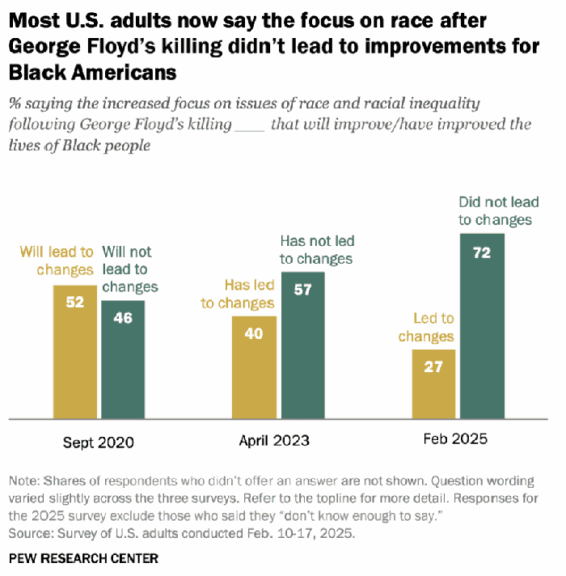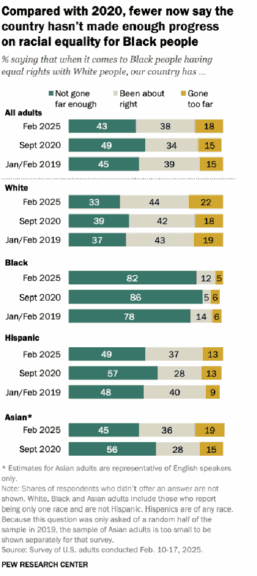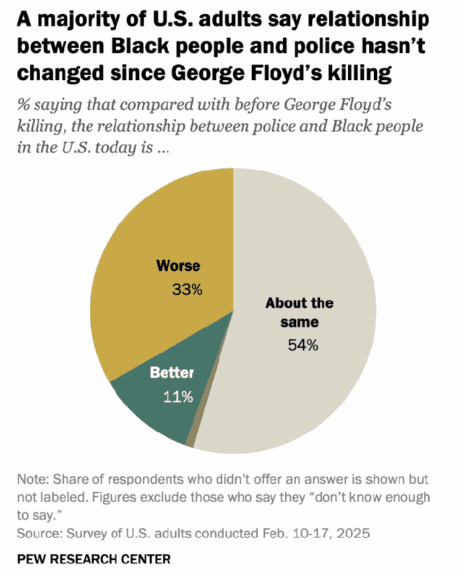This article was originally published by The Emancipator.
This month marks five years since George Floyd was murdered by a White police officer — an internationally condemned act that, coupled with the heightened attention on police brutality and its fatal impact on Black Americans, was a catalyst in 2020 to the so-called “racial reckoning.” It was an era many hoped would lead the country to make lasting progress toward racial equity.
However, according to a study released by the Pew Research Center last week, as the Trump administration dismantles diversity, equity, and inclusion gains and policies across nearly every sector of American society, many Americans believe the increased focus on race and racial inequality after Floyd’s murder did not lead to changes that improved the lives of Black people.
More than half of U.S. adults in September 2020 were optimistic that the focus on racial inequality would lead to changes that improve the lives of Black Americans, the Pew Research Center says.
But nearly five years after the summer of 2020’s “racial reckoning,” that optimism has waned, as 72% now say the increased focus on racial inequality after the murder of George Floyd did not lead to changes that improved the lives of Black people, according to a survey by the Pew Research Center.

Forty-three percent of those surveyed say the U.S. has not done enough on racial equality for Black Americans, including 82% of Black, 49% of Hispanic, 45% of Asian and 33% of White Americans surveyed, according to Pew.
“We have started moving backwards in the equal rights progression we’ve made over the years. With a president like Trump who is getting rid of Black History Month, inclusivity and special initiatives that ensure people of color and underrepresented people will have equal opportunities, this will surely set us back decades.” — White Democrat, mid-30s, told Pew.
“The justice system is not fair when it comes to Black people. When convicted of crimes, Black people always get heavier sentences than their White counterparts, even when they have no prior convictions and come from similar backgrounds as their White counterparts.” — Black Republican, mid-40s, told Pew.
Overall, 38% of those surveyed say the amount of emphasis on race has been about right — with 44% of White respondents feeling that way, 37% of Hispanic, 36% of Asian, and 12% of Black respondents sharing those views.
Meanwhile, 18% of those surveyed believe there is too much emphasis on race and say the country has gone too far with inclusionary efforts, according to Pew. Out of that group, 22% White, 19% Asian, 13% Hispanic, and 5% Black American respondents felt that way.

“Affirmative action is not fair for White people. Less-qualified Black people getting a job over a more-qualified White person because they’re Black. Management being scared to fire a person because of their race when they’ve done something that deserves to get them fired.” — White Republican, early 40s, told Pew.
There are also different opinions on the impact of police videos showing brutality against Black people, according to Pew.
Among those surveyed, 64% of White adults and 74% of Republicans say sharing police brutality videos against Black people makes it harder for police officers to do their job. Fewer than half of respondents of color agreed. And 65% of Black adults say sharing such videos is actually a good policy approach.
When asked about their views on the relationship between police and Black people, 54% of U.S. adults say things are about the same as before Floyd was murdered, according to Pew. Eleven percent say things are better, while only a third say things are now worse.

More people also believe that President Donald Trump’s handling of racial issues will make things worse, according to the Pew survey.
Forty-eight percent of U.S. adults believe Trump will make things worse, while 28% believe he will make things better, according to those surveyed by Pew.
When it comes to the future of racial equality in America, 51% of those surveyed say it is very or somewhat likely that Black people will eventually have equal rights with White people, Pew says. This is down from 60% in September 2020, Pew also notes.
In this category too, there were stark racial differences. While 61% of White respondents believe it is very or somewhat likely Black people will eventually have equal rights with White people and 50% of Hispanics and 41% of Asians feel this way, only 32% of Black people share this sentiment.
Learn more about third-party content on ZanyProgressive.com.





